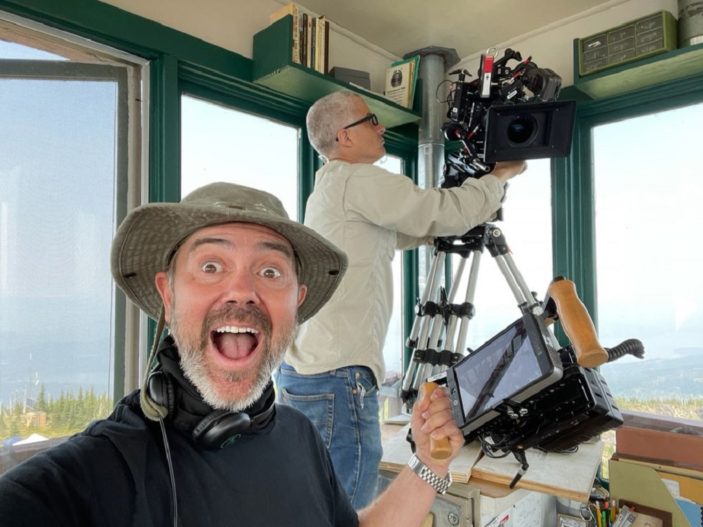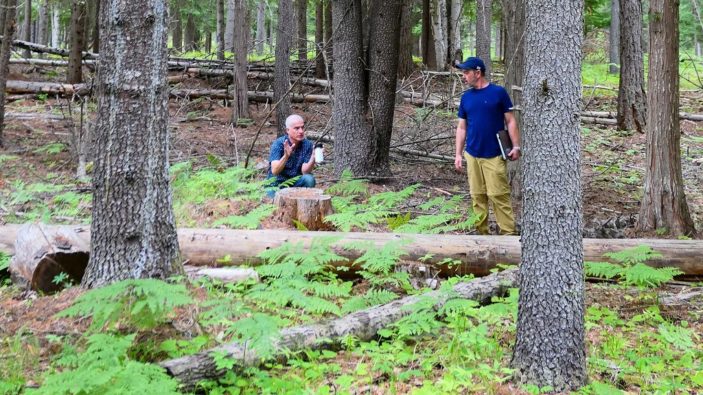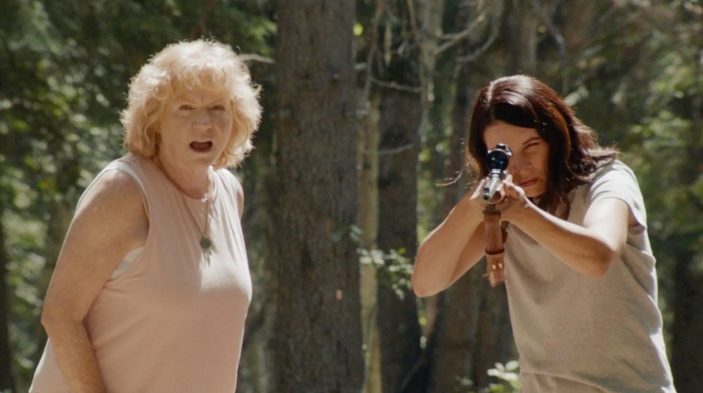
Joe Lo Truglio has long made a name for himself within the comedy scene. Whether it’s as Andy Samberg’s over-sharing right-hand in the acclaimed sitcom Brooklyn Nine-Nine, his various roles in the absurdist Reno 911!, or as one of the many sex-starved “teens” in the cult hit Wet Hot American Summer, Lo Truglio has proven himself as a comedic force to be reckoned with.
Naturally, the next stop is to helm his own horror film.
As his directorial debut, Outpost, arrives on digital platforms in Australia and New Zealand this week (you can read our review here), Peter Gray spoke with the actor-turned filmmaker about his love of the genre, the delicate steps he took in tackling the issue of domestic abuse and PTSD, and the precautions he took to make sure his own marriage survived directing his wife at the centre of his unnerving thriller.
With everything taking place regarding the strikes, I appreciate you taking the time to speak to me about Outpost. I’m a horror fan through and through, and I think many of us saw a horror film we weren’t supposed to at around 12-years-old. Was there one film for you that particularly started your love of the genre?
Well, like yourself, I started early, around 10 or 11 (years old). It began with Stephen King short stories and Fangoria Magazine, (but) in terms of a movie the first thing that pops into my head is Piranha. Joe Dante’s Piranha (from 1978). I think I might have snuck away and caught it on HBO when it was on, but it’s quite possible there were movies before that. I mean, shortly after I remember seeing The Brood for the first time in 1979, and that ended up becoming my favourite horror film. It still is my favourite of all-time.
You have canon movies, like The Shining and Jaws, which, for me, is the reason I got into movies. I remember thinking how did they do everything with Jaws. It scared the shit out of me, (but) it made me look at filmmaking a little more. It began early for me. You know, I wasn’t really a comedy guy. I read Mad Magazine as a kid, but I never watched the old SNL (Saturday Night Live) and I didn’t discover Monty Python until much later. Horror was already there from the beginning, so (Outpost) is kind of just a return to something that I’ve been wanting to do for a long time.
It’s exciting that most people don’t know me, so I already appreciate their patience. I’m not giving up comedy. I love it. I’m going to keep doing it. But this is part of me that no one’s seen, and that’s pretty real and important to me.
Looking at a film like Outpost, it has the air of something that feels as if the mentality of the pandemic and isolation helped. Was this a story that started before or during the pandemic?
Yeah, I wrote the outline in Spring of 2018. We thought we would be shooting rather quickly. That was my own naivete on independent filmmaking. I’m like, “I wrote the script, it’s a small cast, we’ll just go find the tower. Right? Okay!” I thought within a year we’d be doing this. We were actually slated to shoot in the Summer of 2020, and we took all the COVID protocols. We were still going to shoot. We had a lodging, and it was this very rural place in Northern Idaho where there’s not a lot of people. There wasn’t a lot of places for our crew to sleep, so if we lost our rooms we had to go to another town, and that was like an hour away, so that’s exposing you to more COVID, as well as losing production time. We just missed this window and ended up shooting in the Summer of 2021. So from that outline to actually shooting was about 3 years.
You mentioned your own naivete as a filmmaker, but having directed before on television, did that assist you in any way when tackling this film?
It kind of helped, yeah. If you’re an actor, you know how actors like to work, so yes. But where directing an episode of Brooklyn (Nine-Nine) helped was that it taught me to be really over-prepared and to work safely and quickly. That definitely came into play for Outpost. That extra year allowed my DP, Frank Barrera, and I to do an entire shot list. We had some shots already, and we would have been ready if we shot in 2020, but that extra year allowed us to go over everything. We learnt what we didn’t need and the visual language of the movie, so if something goes wrong we knew we can put the camera elsewhere. It was really about how important it is to prepare.

Stephen King and The Shining are obviously strong reference points for this film, and I’ve heard you mention Polanski’s Repulsion as well. When I was watching it they were two films I could definitely see the inspiration from, but there was another that came to mind for me, and because of this film’s reputation I don’t want to offend…
Say it!
I got I Spit On Your Grave vibes from this.
Oh yeah, yeah.
Just the fact that (your lead character) Kate is avenging herself…
That’s fair to say. You know, Last House on the Left is kind of in there too. It wasn’t a movie I had in mind, mainly because of the subject matter, and as you said I wanted to be careful with how I handled this character, because PTSD is a real issue. Mental illness is a very serious issue. And domestic violent is a very serious issue. And as a white cis male writing about that, I wanted to be very careful in how I approached (that). It had to be respectful and somehow not result oriented. I think a lot of people are not going to like this movie. And that’s okay. I think this movie is going to be very divisive. That last act is going to be divisive.
But one of the reasons I think that will be the case is because I think people may misunderstand the message, that this movie is about a person who has been abused (and) they turn into this. That’s not what this movie is saying. I’m not a woman, but I am a person that finds it difficult to ask for help, and Kate is a character who refuses to ask for help. She’s very stubborn in getting the help that she needs, and there’s a consequence for that. That is what is underneath the movie. That’s there’s certain trauma that you can’t handle alone, and if you try to do that it doesn’t always work out the way you think it will.
I wanted to point that out because I want people to see it is different from I Spit On Your Grave and The Last House on the Left. Those are great movies. I love those movies, and they’re exploitive in a great way, but Outpost is slightly different. It’s a nuanced change.

That notion of not being able to ask for help really resonated with me hearing that. I went through some traumatic experiences during the pandemic that led me to finally speak out after feeling like I couldn’t ask for help and that I was being silenced in a way. That helplessness and that strength in Kate was something I related to. Because you’re tackling such a delicate subject, did you speak to any PTSD survivors in order to gage that sensitivity?
I read a terrific book called “The Body Keeps the Score” (by Bessel van der Kolk), and it’s about how, among many other things, how many different statistics of PTSD and domestic abuse (there are) and how the body will hang on to trauma and surface somehow, even if you think you’ve suppressed it. That is kind of what happens in this movie. In addition to that, the stunt coordinator, and not the one we ended up working with, unfortunately, she got a much better paid job with a bigger studio, but she was incredible. Her name is Kimberly Shannon Murphy, and she is an abuse survivor. And I share her name only because she has a book out about that (and) I’m not revealing anything she would want to keep private.
When I was asking her to do the movie I hadn’t known that she was a survivor, and afterwards (reading the script) she complimented me and said how well she thought it was handled. That was helpful and made me feel better. It’s not a perfect script, lord knows, but it meant a lot that someone that actually had been there and had experienced those things thought this was being handled in a way that was respectful for those that have suffered through that.
And going off that, you’re working with your wife on this. And given where this film goes towards its ending, I can only imagine the emotional, physical and mental toll that could have on a performer. Was there ever any worry of what exactly you were putting Beth (Dover) through? There’s obvious faith in her ability as an actress, but is there a conversation had about just how dark things could get?
You know, we didn’t. Which is hilarious! It was quite a monumental risk for the marriage in no uncertain terms. We work together really well, we’ve acted together (before), and it’s a breeze. We’ve tried to write together and that was a nightmare (laughs). But we had a pretty good idea (though) because Beth is the type of actor that can be told what to do or where she needs to be or where she needs to go. Not all actors are like that. So I knew we could work together. I also made a an executive decision for us to stay in separate hotel rooms throughout the entire production, which we both realised might have been the saving grace. I think it was a big help in the marriage surviving that she had a place to decompress after shooting and she wasn’t dealing with her director going through shot lists and keeping her from sleeping. But there wasn’t any emotional damage from going to those dark places. Probably for the best (laughs).
Outpost is available on all digital platforms in Australia and New Zealand from September 13th, 2023.
